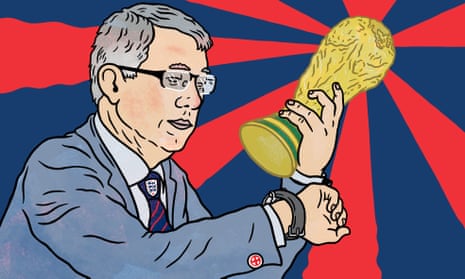It is probably not a date many people have inked into their pocket diary. But last week brought the 10th anniversary of the last time Michael Owen scored for England, the Chester goal ace bagging twice in a 3-0 trouncing of Russia as Steve McClaren’s golden lions sent a war cry across the bows of Euro 2008 qualification Group E, and a quiver of fear through the pigeon-chest of continental Europe itself.
Except of course it didn’t quite work out like that. England were good against Russia at the FA’s excitingly matt-grey new Wembley, an arena fit to stage the 2018 World Cup final and definitely not only loads of tinny pop concerts and musicals. Owen scored his 39th and 40th England goals, bringing closer the inevitable reeling in of Bobby Charlton’s England record, probably in a World Cup final or something.
And for one more Wembley evening there was still a feeling around this England team of a legacy to be discharged, a talent bazooka that just needed to be pointed in the right direction, Steven Gerrard’s frantically pumping legs directed the right way long enough to effect some defining victory.
Or perhaps not. Owen played four more times and didn’t score another goal. England went on to beat a poor Estonia, lose to Russia away, then lose to Croatia at Wembley on one of those wild, era-defining evenings. And in retrospect that 3-0 Wembley win turned out to be a final glimpse of something. England’s last really decent group of players were never quite golden again.
Fast forward 10 years and it has become a reflex response to scoff at the idea England were potential world beaters. But the fact is they were. Given a fair wind, even a slightly different manager, they really could and should have done much better.
At which point the wind chimes tinkle, the screen begins to dissolve and we’re in an alternative timeline: a better world, a world where one small detail might still change everything. I put it to you that had Alex Ferguson left Manchester United in 2002, as planned, and taken over as England manager there is a pretty good chance England would have won the 2006 World Cup.
This isn’t jingoism or Premier League flat-earth syndrome. It’s the truth. Italy’s world champions were well organised, but not necessarily much better. Two World Cups later an equivalent, but far more tactically astute German generation won in Brazil. Just imagine the England team of 2006 led by Ferguson, the best Premier League manager available, or at least by a manager without an unshakeable 4-4-2 fetish or a tendency to spend training sessions going for long mumbling walks with his celebrity captain.
I mentioned this idea of an alternative England timeline on Twitter this week and drew a response that, far from the expected coyote chorus of scorn, was warm and wistful and quietly tolerant. Probably this is because in so-called “reality” the world has turned bad and will soon come to an end in a mushroom cloud of conjoined despotic idiocy. So a little escapism is appealing. But the fact remains there was a turning point back then, a moment where one step the other way might still have made all the difference.
In this timeline Ferguson sticks with his decision to leave Old Trafford. He’s persuaded to take the England job from the year-long caretaker Peter Taylor. He leads the team to Japan and South Korea and starts the messy business of stiffening its spine, snapping down on any gathering debaucheries. After defeat to Greece in the final of Euro 2004, blamed by Ferguson in an angry rant to the TV cameras on the quality of the ball-boys, England’s manager returns from a four-match ban to lead an imperious World Cup qualification.
Gerrard’s switch to right-back before the tournament is key. And from the group stage England play with the freedom of Ferguson’s best United teams. A Paul Scholes-Owen Hargreaves midfield offers balance, with David Beckham and a super-fit Kieron Dyer rampant on the wings. A de-Mourinho’d Joe Cole is outstanding as a deep playmaker behind the eventual golden boot winner, Jermain Defoe. The Newcastle tearaway Wayne Rooney, so promising at Everton, is unfit and left out of the squad.
In the quarter-finals England storm through the deathly defensive football of Carlos Queiroz’s Portugal. They beat France in the semis after Zinedine Zidane is sent off for brutally head-butting John Terry. A thrilling final against Italy is decided by a late long range scissor-volleyed winner from Scholes.
Naturally when I put this nuclear scenario to social media there was concern for the wider footballing word. I can confirm that with Ferguson gone Arsene Wenger takes over at United. He’s still there now. Glenn Hoddle’s Arsenal are beaten by Southampton in the 2003 FA Cup final, on the back of which the Saints are bought by Russian oligarch Roman Abramovic and seal a first league title at Glenn Roeder’s relegation bound Chelsea.
There are wider ramifications. With United and Arsenal in disarray Newcastle win the 2002-03 league title. Sadly during the celebrations Tony Blair ricks his neck playing head tennis with Bobby Robson, retires from politics and is unable to help start the Iraq war a year later. Even more tragically, as Ferguson travels by helicopter to accept the freedom of Aberdeen in July 2006 there are complications in heavy weather at a congested heliport. By some miracle Highland golf entrepreneur Donald Trump is the sole fatality in the ensuing fireball.
Meanwhile Britain rides a wave of shared world champion confidence, steeling itself through the banking crisis, rejecting austerity politics, laughing off the idea of leaving Europe, and voting to dismantle the monarchy instead as we enter new era of meritocratic prosperity under president Beckham’s Centrist Dad movement.
There is, arguably, a bit of a point to all this. As English football continues to thrash about in a state of profound institutional funk it has become an accepted truth that its problems are entirely of the root-and-branch type, a function, even of some wider moral failing. Hence the current spiral of self-immolation, a national sport that finds itself dressed by spivs and snake-oil salesmen, drowning in cash and flux while the latest raft of trapped, doomed homemade talent batters away pointlessly at ever tinier margins like a moth inside a lampshade.
Executive failure, Premier League dominance, Ferguson’s insistence on handing over the England team to David Moyes just before the disastrous Euro 2012 campaign: none of this has particularly helped. But looking back it is tempting to wonder, just a bit, about the long-term effects of failure to rise to that high water mark, the last flickerings of when we were golden.

